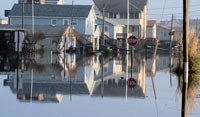May 13, 2010
Major disruptions in industrial societies liven the news. Dense populations and properties fatten the damage, and complex industrial societies are highly vulnerable. Imagine New York City without electrical power for a week.
 Natural disasters include eruptions, earthquakes, hurricanes – even epidemics. Human error disasters are typified by the Gulf oil spill. Deliberate disasters are wars or terrorist attacks. Just the threat of terrorism is very effective because of its huge leverage: cheap threats consume enormous resources to defend.
Natural disasters include eruptions, earthquakes, hurricanes – even epidemics. Human error disasters are typified by the Gulf oil spill. Deliberate disasters are wars or terrorist attacks. Just the threat of terrorism is very effective because of its huge leverage: cheap threats consume enormous resources to defend.
From an expansionary economic view, big disruptions may seem on balance to be a social benefit. Losses are understated. Remediation uses a lot of resources and puts people to work. Within a year or so, the GNP of the affected area is apt to rise.
From a Compression viewpoint this looks very different. Vast destruction eats into our stock of limited resources. Securing quality of life requires more forethought than simply rebuilding. Processes robust to disruption will be important in Compression.
For many reasons disruption may become very common in 21st century industrial societies. Coping with them will become routine. This captured interest at an international operations management meeting last week (POMS). Coping has three phases: 1) Planning and preparation; 2) Reaction; and 3) Remediation or recovery.
- Planning and preparation: Ability to predict natural disruptions is steadily improving. Lead times range from a few hours to weeks, but forecasting is never certain. Credible plans need to determine how to mitigate or even prevent a huge range of possibilities, and be tested by practice. Credible warning allows us to pre-launch such plans.
- Reaction: Plans never work out exactly, but give us courses of action to deviate from. Reaction begins with response to warnings. We soon disregard constant cries of wolf, but if a “big one” hits, we wish we had heeded one. Educating people how to interpret uncertain warnings is itself a challenge.
- Remediation: For the wise, remediation is an improvement opportunity. What lessons were learned? Can they be applied to better mitigate or preclude future disruptions? Leadership is important. For example, after a community is destroyed, some may be tempted to nostalgically “restore what we had,” rather than prepare for “the next big one.”
Infrequency of disasters creates their psychology, which is a major factor contending with them. Despite redundancy and fail-safe mechanisms, product or process complexity multiplies the opportunities for things to go wrong, while a disaster results from everything lining up for a “perfect storm.” For example, air passengers are delayed when pilots and mechanics check whether a light warns of a real problem, or a sensor is faulty – again. Replace the sensor. Usually the warning light goes off. If this happens often, what does a warning light mean? Some complex software, before sounding a “real alarm,” double checks a sensor by seeing whether other sensor readings are consistent with a serious problem.
The psychology of disasters is similar to that of contending with Compression in general. We prefer not to think about it until we have to think about it, which may be too late. Leadership has to convert pessimism and denial into a positive quality of life challenge.
